Οι ηθικοί αφορισμοί του Wittgenstein: Τα σύγχρονα «εις εαυτόν» ή πως «κουβεντιάζεται» η σιωπή
Ενότητα:
Άρθρα του περιοδικού "Φιλοσοφία"
Χρονολογία έκδοσης περιοδικού
1980-1981
Περισσότερα...
Τύπος
Επετηρίδα
Συγγραφέας
Δραγώνα - Μονάχου , Μυρτώ
Περισσότερα...
Τίτλος άρθρου/ανακοίνωσης
Οι ηθικοί αφορισμοί του Wittgenstein: Τα σύγχρονα «εις εαυτόν» ή πως «κουβεντιάζεται» η σιωπή
Γλώσσα: Ελληνικά, Νέα (1453-)
Θεματική ενότητα άρθρου/ανακοίνωσης
Ιστορία της Φιλοσοφίας
Ηθική
Γλώσσα άρθρου
Ελληνικά - Νέα (1453-)
Αγγλικά
Περίληψη άρθρου
About 1930 Julian Bell lampooned Wittgenstein for placing values beyond the world, for considering ethical statements nonsensical and still for breaking his own "vow of silence" in talking ethics and aesthetics "day and night". Russell had also remarked in his "Introduction" to the Tractatus that, although Wittgenstein placed ethics "in the mystical, inexpressible region, nevertheless, he was capable of conveying his ethical opinions". As a matter of fact, according to the Tractatian doctrine of ethical silence —subsequent to Wittgenstein΄s theory of significant language as picturing the world— ethics is unsayable and should be passed over in silence, even if ethical statements were to be taken as elucidations together with the philosophical propositions of the Tractatus. For all the advances of the Lecture on Ethics, since the doctrine of the supernatural character of ethics was still held, the transcendental idealism of the Tractatus was equally valid and ethical ex-pressions were also considered nonsensical. As it is well known, Wittgenstein΄s "metaethical" views changed during the middle and final phases of his philosophy as a corollary of his shifting from the meaning to the use of language and of his substituting grammar for logic. The argument for the inexpressibility of ethics was implicitly dropped, ethics came to be regarded as one of the forms of life with its own language game, and ethical expressions were re-admitted to significance. However, since in these periods Wittgenstein said practically nothing on ethics in his technical works, his earlier views became "canonical" and his moral aphorisms were mostly considered somehow inconsistent with them. Wittgenstein though, in the above mentioned lecture defined ethics as the universal "tendency to go beyond the world and significant language", and showed great respect for it as a "document of the tendency of the human mind to say something about the ultimate meaning of life". In a later discussion he considered this "thrust against the limits of language" as a personal matter, in which a man can speak "in the first person" only "for himself", irrespective of any explanation and theory. For, "if he needed a theory in order to explain to another the essence of the ethical, the ethical would have no value at all". It is in this light that the recently published collection of notes about ethics, art, religion and other subjects, under the English title Culture and Value (Oxford 1980), should be seen, although almost all of these reflections date from the middle and later periods, when the doctrine of the inexpressibility of values was practically abandoned and value statements were considered meaningful within their cultural context. Yet, the awe in front of the trans-cendental is still manifest in some of them, and their personal, intimate character too prominent to allow them to be taken simply as describing human phenomena. Being convinced by the editor of this volume that "these notes can be properly understood and appreciated only against the background of Wittgenstein΄s philosophy and, furthermore, that they make a contribution to our understanding of that philosophy", I have tried in this paper, dedicated to Wittgenstein in memoriam for the 30th anniversary of his death, to present some of his moral aphorisms contained in it and make some comments on them, after I have given a short account of his "metaethical" and moral views found in other writings and testimonies. Wittgenstein could not write a book on ethics considering such a book "intrinsically sublime" and too wonderful to be possible. Yet, apart from the theoretical and normal ethical views of the Tractatus and the Lecture on Ethics, he advanced some ethical opinions in his Lectures on Aesthetics. We also have valuable additional information about his ethical views and attitudes from Moore΄s account of his 1930-33 lectures, from his discussions with Waismann, and from some theses recorded by Rush Rhees. Moreover, the positivist and existentialist —mostly negative to ethics— interpretations of the Tractatus have been recently modified, due to some re-interpretations of this work, considered not only as an "ethical deed", but also as an ethical work in itself, on account of a new reading of the "Preface" and the famous letter to von Ficker along with some recent biographical documents. After a presentation of his main ethical and moral views and a full survey of all the available bibliography on Wittgenstein΄s ethics, I have summarized some of the ethico-religious aphorisms found in the Notebooks, especially those not included in the Tractatus, as an introduction to my tentative appreciation of the recently published aphorisms. I view these aphorisms as a modern version of Marcus Aurelius΄s Meditations, or "Thoughts addressed To Himself" on account of both their form and content and of what Wittgenstein himself said of his philosophy: "Nearly all my writings are private conversations with myself; things that I say to myself tête à tête" (CV 77/1948). These reflections take up the dialectics of the Notebooks in a certain sense, after the gap of Wittgenstein΄s philosophical silence and life of ethical action. In both, Wittgenstein speaks mostly as an ethical personality, a religious and aesthetic man, and not as a "metaethical" philosopher. There is, in both documents a traditional theonomic ethics with discernible Stoic attitudes (and in the aphorisms of an occasional Heraclitean shade). In these aphorisms, moreover, Wittgenstein speaks as a poet with similes and metaphors, using language in an extraordinary way and viewing the world aesthetically. The assessment of certain scholars that Wittgenstein΄s main contribution to philosophy was a new philosophical style rather than a new philosophy is fully justified by theses aphorisms which will conduce to our viewing Wittgenstein as a sensitive intellectual of a traditional sort and not only as a radical logician. And they will help us to understand his saying: "How can I be a good logician if I am not yet a man?"
Λέξεις -κλειδιά
Ludwig Wittgenstein
Σιωπή
Creative Commons
Αναφορά Δημιουργού - Μη Εμπορική Χρήση - Παρόμοια Διανομή 4.0 Διεθνές - CC BY-NC-SA

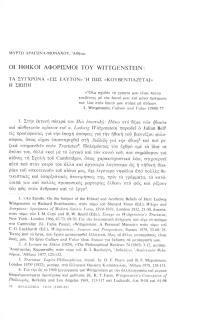
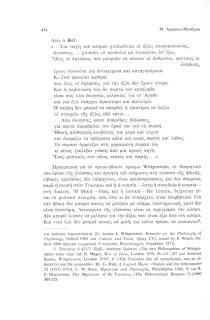
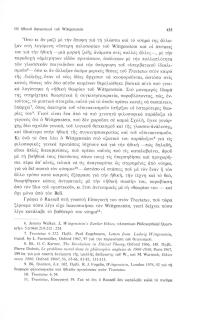
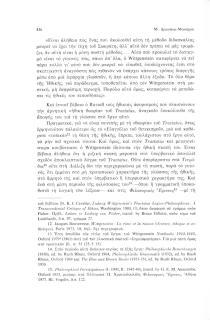
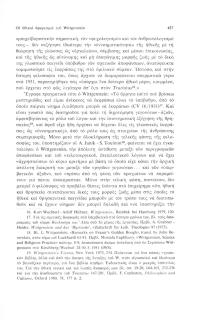
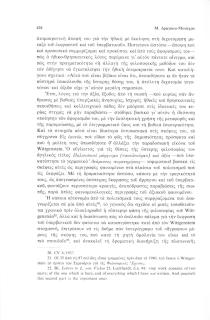
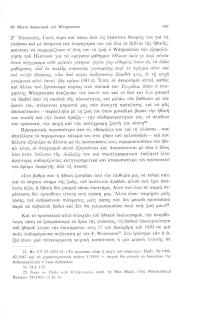
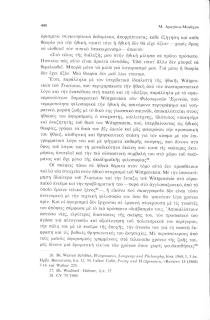
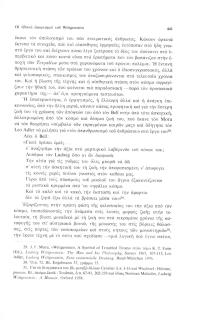
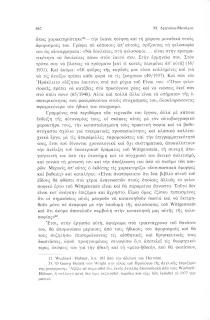
 Ξεφύλλισμα pdf
Ξεφύλλισμα pdf